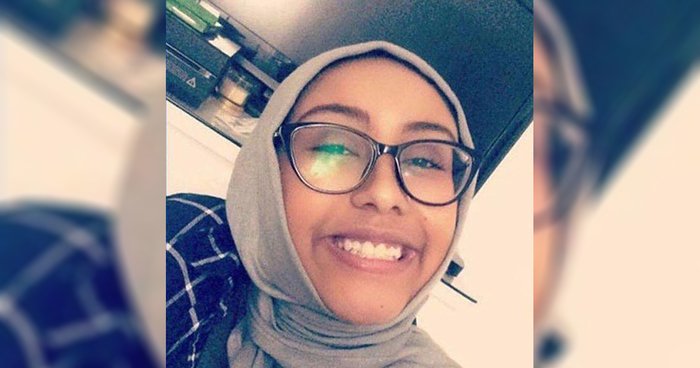by Hira Uddin – Follow @hira_cane 
Dear Mr. Zaman,
You recently posted a public status during the time that tragic news of Nabra Hassanen’s senseless murder had emerged, the crux of which I have included below:
“If you claim to be a man (or even a boy, for that matter) and you see a sister being attacked, and you run, you are not a man. You’re not even a vertebrate. Brothers, hear me well: You must DIE before you allow harm to come to a sister. You must GIVE YOUR LIFE to save her. If you flee so that you can live, you don’t deserve to breathe another breath. I don’t want to hear anyone ever say anything about Hijab or Mahram or men being protectors of women or ANY of that until every so-called Muslim man understands that giving one’s life to save a sister is the only option.” (cont’d on Facebook, Shibli Zaman)
Although I do not personally know you nor do I follow you on social media, your post popped up on my feed because of a mutual friend’s interaction. I was immediately taken aback by your degrading and demeaning tenor addressing the male Muslim youth that were with sister Nabra that terrible night. Not only that, but your tone was arrogant and exuded a “mightier/more-macho-than-thou” stench — nearly implying that had you or these other “mighty men” been present, this heartbreaking act of violence would not have transpired. I was initially hesitant to comment on your post for several reasons, but as I read it in full, I realized you were essentially stating that the young teenagers present with Nabra “…don’t deserve to breathe another breath,” after you likened them to invertebrates lacking a backbone because they fled out of fear for their own lives.
[Read More: “Teenager Nabra Hassanen Murdered While Returning from Mosque During Ramadan“]
I wrote a comment disagreeing with your harsh criticism of these youth and advising you that although you are entitled to your opinion, you are not entitled to shaming the surviving youth or inciting self-hatred within their hearts. I pointed out that your public thoughts, which apparently were shared over 1000 times, served as a divisive sentiment while the Muslim community was already grieving and emotions were high. To my surprise, you deleted my comment from that post instead of addressing it, so this is why I chose to address you and the deeper negative implications of your post in this manner.
What’s more is that you posted an addendum to this problematic post, only to further embolden the previous condemnation of the youth by passing off your opinion as “factual.” Regardless of how many “followers” you may have on social media, you do not get to pass off your opinion as a fabricated fact within the context of Islam. Undoubtedly, the teachings of Islam and Prophet Muhammad, upon him be peace, advise us to stand for justice and fight against social, religious, and economic oppression to the best of each of our capabilities. However, to advise youth who will have to confront their own inaction the night of Nabra’s kidnapping for the rest of their lives that they are somehow subhuman is upsetting to say the least. If you are trying to cultivate a sense of responsibility among Muslim male youth, publicly shaming them for an incident out of their control is not the way to achieve that.
Perhaps you can raise awareness with the same zeal and fervor regarding domestic violence or relationship abuse within Muslim marriages instead. Maybe reserve this harsh criticism for Muslim men who are complicit and aware of their wrongdoing while oppressing sisters within the privacy of their own homes instead. It is very easy for anyone not present during the incident to project a superhero mentality – thinking “I wouldn’t have allowed that act of violence/cruelty/oppression to happen” but the hard truth is that we do not know what we would have done if we were placed in the same circumstances. Fear is a very real emotion that is recognized and acknowledged even by God when illustrating how mankind will feel on the Day of Judgment, just as one example:
“The Day ye shall see it, every nursing mother will forget her nursling and every pregnant female shall drop her load (unformed)…” (The Holy Quran, Al-Hajj, 22:2)
The imagery used in this verse is deliberately juxtaposing a nursing mother, the epitome of security and protection for a helpless newborn infant, with the paralyzing emotion of fear out of what is to come. Thinking about this within our worldly mind frame and especially for new mothers, it’s unfathomable that a mother would abandon her newborn baby or forcibly deliver what is within her womb preterm simply out of sheer fear; perhaps that is exactly what God is conveying through this short verse: we do not have knowledge of the unseen. No matter how physically fit or mentally strong we may perceive ourselves to be, there are certain events beyond our control where the circumstances overpower the best within us.
[Read More: “Slain Muslim Teen Nabra Hassanen’s Memorial Burned in Nation’s Capitol“]
Would you also consider surviving members of the Grenfell Tower blaze not deserving of living because perhaps they fled while the whereabouts of some family members are still unknown? Would you apply this same harsh logic to the surviving girlfriend of Philando Castile, because she witnessed the brutal shooting of her boyfriend before her very eyes and was unable to stop the murdering officer? I certainly hope the absurdity behind survivor-shaming is evident and that you will share thoughts addressing members of a community you have not personally spoke to in a more responsible and conscious manner.
I ended my comment which you deleted on your post with prayers for Nabra Hassanen, her family, and the entire grieving community for this tragic loss. Shaming the survivors of a terrible incident and telling them they don’t deserve to breathe or equating them to invertebrates is not the way to honor the legacy of those who have passed. I will leave you with the following advice from Prophet Muhammad, peace be upon him:
“If anything happens to you, do not say, ‘If only I had such and such, then such and such would have happened.’Say instead, ‘Qaddar Allah (Allah decreed and what He wills happens), for ‘if only’ opens the door to the Shaytaan. Know that whatever befalls you, you could not have avoided, whatever does not happen to you, you could not have made it happen to you.” (Sahih Muslim)
 Hira Uddin works as a Qualified Mental Health Professional in Texas. Uddin is also the editor of her website InsideAmericanMosques.com.
Hira Uddin works as a Qualified Mental Health Professional in Texas. Uddin is also the editor of her website InsideAmericanMosques.com.





